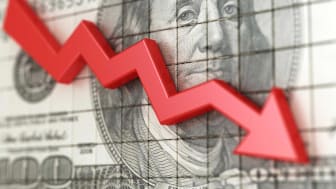Older workers and retirees are understandably concerned about the impact the COVID-19 pandemic, and the resulting economic uncertainty, could have on their retirement.
Of course, those who made a point of planning for a financial slump – knowing it’s never a matter of if, but when a market downturn might happen – are generally in a better position than those who did not. This is why experienced financial advisers repeatedly (maybe even obnoxiously) urge their clients to be prepared for multiple economic crises during what is likely to be a long retirement.
But if you aren’t sure where you stand given this current crisis or how you’ll fare in the future, there are several strategies you can still adopt to protect your retirement income going forward.
Here are tips for avoiding or overcoming five common retirement mistakes in this challenging financial environment … or at any time.
You can significantly increase your retirement income by delaying your retirement date, even if it’s just for a year or two.
Of course, workers who get laid off or furloughed may not have control over this decision. If that describes you, you could be in a tough spot. Even if you can find another job, you might not earn the same salary you once did. But if possible – and I understand this could be a big if – try to find work, even part-time work, that could help postpone the time when you start your Social Security benefits and begin tapping into your retirement savings.
If you need money to make ends meet, try to find another source of cash – maybe by taking on some type of gig work or by filing for unemployment benefits. (Yes, these benefits are limited and can be difficult to obtain in some states, but if the money helps you preserve your retirement savings, it will be worth the effort.) If you’ve been laid off, ask your employer for severance benefits, part-time work or contract work or any other form of assistance the company may be able to supply, such as outplacement or financial counseling services.
If you do get laid off or furloughed and you’re 62 or older, you’re eligible to start your Social Security benefits. But for most people, starting benefits early is a mistake. Those benefits offer important protections against some common retirement risks, including stock market crashes, inflation (thanks to cost-of-living adjustments) and outliving your savings. The longer you wait (but no later than age 70), the higher your benefits will be and the more protection you’ll get.
I know it’s tempting. The benefits are there, you’ve earned them, and you need them. But most people are actually better off financially if they tap their retirement savings and other assets, such as investment accounts or whole life insurance, instead of filing for Social Security. In my opinion, it’s usually smarter to use your retirement savings to fund a bridge strategy that enables you to delay starting Social Security benefits for as long as possible in order to maximize the payment you receive.
It’s easy to get caught up worrying about what’s going to happen next with the stock market. Both the fear of a crash and the fear of missing out on future market gains are prevalent today, and those concerns can set up investors for unnecessary investment losses and overwhelming mental stress.
Instead of focusing on these fears, why not design an investment strategy that helps you survive economic downturns, which are inevitable. Start by covering your basic living expenses with guaranteed sources of retirement income (Social Security, pensions if you’ve earned them, annuities, monthly installments from a reverse mortgage) that won’t drop if the stock market crashes.
Then, before you make your next investment decision, estimate what portion of your total retirement income is truly risk protected. For many people, it might be 75% or more. If the protected amount is high, you likely can afford to take a calculated risk and invest in the stock market to generate the money you’ll use to cover discretionary living expenses, such as travel, hobbies and spoiling grandchildren. These are expenses you could reduce if the stock market drops. And you can ride out the ups and downs of the stock market knowing you have a reasonable long-term investment strategy.
Today, more than ever, it’s critical to make sure you have the insurance coverage you need to stay healthy.
If you retire before age 65, you’ll need to find health insurance to bridge the gap until you’re eligible for Medicare. Possible sources could include COBRA continuation coverage, the Health Insurance Marketplace or your spouse’s employer. If you’ve been laid off, ask if your employer can provide health insurance for you for a designated period, or if the company can extend your eligibility for COBRA coverage.
If you’re 65 and eligible for Medicare, it’s important to be aware of Medicare’s substantial deductibles and copayments. And basic Medicare doesn’t cover all of the expenses commonly covered by employer-sponsored health care plans, such as dental, vision, hearing, acupuncture, and some chiropractic services. As a result, you’ll need to spend time shopping for additional coverage through a Medicare Supplement Plan or Medicare Advantage Plan. Each type has its pros and cons, so do your research to find out which is best for you.
These are difficult times, and it’s easy to be both intimidated and frustrated by the challenges ahead – especially if you’re out of work. It may feel as though the easiest move is to just give up and call yourself retired. Instead, be relentless with your networking efforts and updating your skills, including learning how to navigate social media and the online world. Maybe it’s time to start your own small service business. Or try volunteering to make contacts that could lead to paid work.
In the meantime, adjust your financial plan to accommodate what’s happening now and to protect your future.
Planning for retirement in times like these requires resilience. Marshal all your resources. You can do it.
Kim Franke-Folstad contributed to this article.
President, Barnett Financial and Tax
Rick Barnett is president and founder of Barnett Financial & Tax, a one-stop financial hub for clients in Michigan and beyond. He hosts the “Barnett Financial Hour” radio show and often serves as a source on local TV news stations. His professional designations include Certified Estate Planning Professional (CEPP), Masters of Estate Preservation (MEP) and Christian Financial Consultant and Advisor (CFCA).
The appearances in Kiplinger were obtained through a PR program. The columnist received assistance from a public relations firm in preparing this piece for submission to Kiplinger.com. Kiplinger was not compensated in any way.






